 March 2024 in “Bioscientia medicina”
March 2024 in “Bioscientia medicina” The rs6152 allele is not a good marker for baldness in the Indonesian population, but family history, age, gender, high blood pressure, and body weight are linked to the risk.
 17 citations,
November 2013 in “American Journal of Primatology”
17 citations,
November 2013 in “American Journal of Primatology” Different monkey species in a lab showed varying levels of hair loss due to factors like type, sex, age, season, and living conditions.
 17 citations,
June 2012 in “The Anatolian journal of cardiology”
17 citations,
June 2012 in “The Anatolian journal of cardiology” Premature hair graying may be a sign of increased risk for heart disease, indicating biological age is more important than actual age.
December 2022 in “The Aging Male” Lower 2D:4D ratio and older age increase the risk of severe hair loss in men.
 20 citations,
September 1978 in “International Journal of Dermatology”
20 citations,
September 1978 in “International Journal of Dermatology” Hair growth is influenced by factors like genetics and nutrition, and more research is needed to understand hair loss and growth mechanisms.
52 citations,
July 1994 in “Journal of gerontology” Women are more likely than men to hide their age due to societal pressures.
 6 citations,
October 2015 in “International Journal of Women's Dermatology”
6 citations,
October 2015 in “International Journal of Women's Dermatology” Hair aging is inevitable, but using the right hair care products can help maintain hair health.

Different hair and nail conditions can indicate health issues and have specific treatments; accurate diagnosis is crucial before treatment.
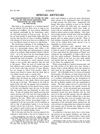 6 citations,
May 1941 in “Science”
6 citations,
May 1941 in “Science” Ducks can get the Rous sarcoma virus if infected shortly after birth, leading to tumors and disease spread.
17 citations,
May 2020 in “Forensic Science International Genetics” Genetically variant peptides are reliable for forensic identification despite age-related changes in hair proteins.
 3 citations,
August 2017 in “Journal of evolution of medical and dental sciences”
3 citations,
August 2017 in “Journal of evolution of medical and dental sciences” The study concluded that the most common skin changes in elderly people are wrinkles and dry skin, with various infections, benign tumors, and changes in nails and hair also being significant.
 2 citations,
August 2019 in “International Journal of Cosmetic Science”
2 citations,
August 2019 in “International Journal of Cosmetic Science” Older age and certain lifestyles are linked to thinner, weaker hair, while how you see your hair relates to its thickness.
 26 citations,
July 1995 in “Neurobiology of Aging”
26 citations,
July 1995 in “Neurobiology of Aging” Finasteride affects prostate weights and pituitary activity differently with age.
 1 citations,
July 2017 in “Journal of evolution of medical and dental sciences”
1 citations,
July 2017 in “Journal of evolution of medical and dental sciences” Older people in Kerala often have skin conditions, with dry skin being the most common, and certain skin issues are linked to high cholesterol and diabetes.
96 citations,
December 2018 in “Immunity” Targeting TGFβ can improve skin immunity in older people.
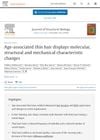 2 citations,
October 2022 in “Journal of structural biology”
2 citations,
October 2022 in “Journal of structural biology” Older thin hair is not just thinner but also has different shape, structure, and stiffness.
 June 2020 in “IP Indian journal of clinical and experimental dermatology”
June 2020 in “IP Indian journal of clinical and experimental dermatology” Older people more commonly have skin conditions related to aging, and early treatment can improve their quality of life.
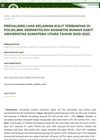 December 2024 in “Media Dermato Venereologica Indonesiana”
December 2024 in “Media Dermato Venereologica Indonesiana” Acne vulgaris was the most common skin disorder overall.
3 citations,
December 2019 in “Biomaterials Research/Biomaterials research” Calcium and magnesium in hair increase with age and are higher in adult women.

Older women's scalp cells show changes that could contribute to hair thinning.
 17 citations,
February 2013 in “Cancer Epidemiology, Biomarkers & Prevention”
17 citations,
February 2013 in “Cancer Epidemiology, Biomarkers & Prevention” Early balding at 40 increases prostate cancer risk.

Older male COVID-19 patients are more likely to experience hair loss.
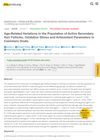
Younger goats produce more cashmere and have healthier hair follicles due to better antioxidant capacity.
11 citations,
October 2020 in “General and comparative endocrinology” Male C57BL/6 mice show age-related fluctuations in certain hormones and their ratios in both blood and hair.
 24 citations,
November 2016 in “Molecular Medicine Reports”
24 citations,
November 2016 in “Molecular Medicine Reports” Hormonal imbalances, often indicating conditions like PCOS, are common in women with hard-to-treat acne, and a treatment approach addressing these imbalances may be needed.
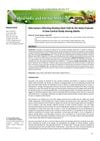 June 2023 in “Journal of Ayurvedic and Herbal Medicine”
June 2023 in “Journal of Ayurvedic and Herbal Medicine” Age, stress, and anger increase the risk of hair fall.
17 citations,
November 2010 in “Perspectives on Psychological Science” Feeling younger can improve health and extend life.
 14 citations,
December 2020 in “Journal of Investigative Dermatology”
14 citations,
December 2020 in “Journal of Investigative Dermatology” Aging causes changes in the scalp that can affect hair growth and lead to older-looking hair in women.
 January 2017 in “Journal of traditional medicine & clinical naturopathy”
January 2017 in “Journal of traditional medicine & clinical naturopathy” Combining trichology and homeopathy is effective for diagnosing and treating hair loss.
 September 2021 in “Fertility and Sterility”
September 2021 in “Fertility and Sterility” Older men have different fertility histories and factors affecting fertility, suggesting they may benefit from earlier fertility evaluations.






















